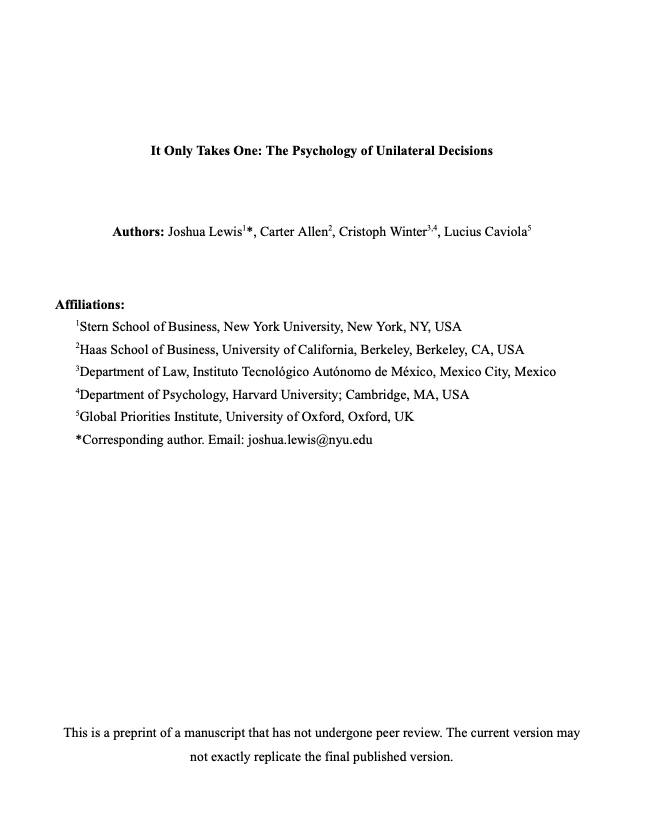It Only Takes One: The Psychology of Unilateral Decisions
Joshua Lewis (New York University), Carter Allen (UC Berkeley), Christoph Winter (ITAM, Harvard University and Institute for Law & AI) and Lucius Caviola (Global Priorities Institute, Oxford University)
GPI Working Paper No. 14-2024
Sometimes, one decision can guarantee that a risky event will happen. For instance, it only took one team of researchers to synthesize and publish the horsepox genome, thus imposing its publication even though other researchers might have refrained for biosecurity reasons. We examine cases where everybody who can impose a given event has the same goal but different information about whether the event furthers that goal. Across 8 experiments (including scenario studies with elected policymakers, doctors, artificial-intelligence researchers, and lawyers and judges and economic games with laypeople, N = 1,518, and 3 supplemental studies, N = 847) people behave suboptimally, balancing two factors. First, people often impose events with expected utility only slightly better than the alternative based on the information available to them, even when others might know more. This approach is insufficiently cautious, leading people to impose too frequently, a situation termed the unilateralist’s curse. Second, counteracting the first factor, people avoid sole responsibility for unexpectedly bad outcomes, sometimes declining to impose seemingly desirable events. The former heuristic typically dominates and people unilaterally impose too often, succumbing to the unilateralist’s curse. But when only few people can impose, who know the stakes are high, responsibility aversion reduces over-imposing.
Other working papers
A paradox for tiny probabilities and enormous values – Nick Beckstead (Open Philanthropy Project) and Teruji Thomas (Global Priorities Institute, Oxford University)
We show that every theory of the value of uncertain prospects must have one of three unpalatable properties. Reckless theories recommend risking arbitrarily great gains at arbitrarily long odds for the sake of enormous potential; timid theories recommend passing up arbitrarily great gains to prevent a tiny increase in risk; nontransitive theories deny the principle that, if A is better than B and B is better than C, then A must be better than C.
What power-seeking theorems do not show – David Thorstad (Vanderbilt University)
Recent years have seen increasing concern that artificial intelligence may soon pose an existential risk to humanity. One leading ground for concern is that artificial agents may be power-seeking, aiming to acquire power and in the process disempowering humanity. A range of power-seeking theorems seek to give formal articulation to the idea that artificial agents are likely to be power-seeking. I argue that leading theorems face five challenges, then draw lessons from this result.
Social Beneficence – Jacob Barrett (Global Priorities Institute, University of Oxford)
A background assumption in much contemporary political philosophy is that justice is the first virtue of social institutions, taking priority over other values such as beneficence. This assumption is typically treated as a methodological starting point, rather than as following from any particular moral or political theory. In this paper, I challenge this assumption.

